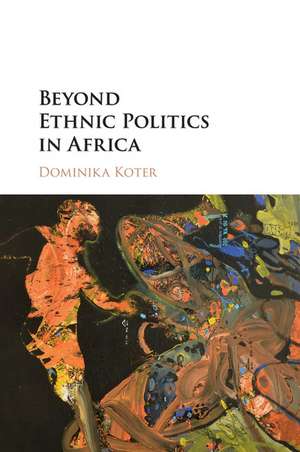Beyond Ethnic Politics in Africa
Autor Dominika Koteren Limba Engleză Paperback – 7 feb 2018
| Toate formatele și edițiile | Preț | Express |
|---|---|---|
| Paperback (1) | 282.48 lei 6-8 săpt. | |
| Cambridge University Press – 7 feb 2018 | 282.48 lei 6-8 săpt. | |
| Hardback (1) | 542.40 lei 6-8 săpt. | |
| Cambridge University Press – 12 oct 2016 | 542.40 lei 6-8 săpt. |
Preț: 282.48 lei
Nou
Puncte Express: 424
Preț estimativ în valută:
54.05€ • 56.74$ • 44.86£
54.05€ • 56.74$ • 44.86£
Carte tipărită la comandă
Livrare economică 11-25 aprilie
Preluare comenzi: 021 569.72.76
Specificații
ISBN-13: 9781316622759
ISBN-10: 1316622754
Pagini: 218
Dimensiuni: 153 x 230 x 15 mm
Greutate: 0.33 kg
Editura: Cambridge University Press
Colecția Cambridge University Press
Locul publicării:New York, United States
ISBN-10: 1316622754
Pagini: 218
Dimensiuni: 153 x 230 x 15 mm
Greutate: 0.33 kg
Editura: Cambridge University Press
Colecția Cambridge University Press
Locul publicării:New York, United States
Cuprins
1. The challenge of winning votes and ethnic politics in Africa; 2. A theory of social ties and electoral politics; 3. Social structure and its origins; 4. Mobilization strategies and electoral outcomes in Senegal and Benin; 5. Intermediaries in urban and rural settings; 6. Social structure and ethnic politics in Africa and beyond; 7. Conclusion.
Recenzii
'Scholars have long recognized the importance of ethnic appeals in African political life. But in this smart and well-argued book, Koter provides an original theory of how existing local social and political structures affect the likelihood that politicians will actually play the 'ethnic card'. She draws on a rich set of comparative and historical analyses to support her argument, and makes an important scholarly contribution. Beyond Ethnic Politics in Africa will be of interest to students of African politics and of comparative ethnic politics more broadly.' Evan S. Lieberman, Total Professor of Political Science and Contemporary Africa, Massachusetts Institute of Technology
'Dominika Koter asks an important question in this excellent book: why does political mobilization occur along ethnic lines in some African countries but not others? Although social scientists have long studied the consequences of 'ethnic politics', few have sought to explain why such identity cleavages become activated in the first place. In a convincing, historically rooted analysis, Koter shows that politicians are more likely to pursue ethnic-based mobilization when traditional authorities and local intermediaries lack the power to shape the electoral behavior of their communities. Beyond Ethnic Politics in Africa offers a welcome contribution that should be read by scholars of ethnicity, clientelism, and democratization.' Leonardo R. Arriola, Associate Professor, Political Science, and Director, Center for African Studies, University of California, Berkeley
'Dominika Koter presents a forceful and convincing argument, which makes an important contribution to the literature. It is shown that electoral mobilization along ethnic lines is not unavoidable, with politicians resorting to ethnic politics only when local leaders in their country cannot act as credible electoral intermediaries. Although more research needs to be conducted to positively assert that this argument can be generalized, Beyond Ethnic Politics in Africa should be essential reading for students and scholars of African politics broadly, and ethnicity, electoral politics and clientelism more specifically.' Athanasios Stathopoulos, Democratization
'Dominika Koter asks an important question in this excellent book: why does political mobilization occur along ethnic lines in some African countries but not others? Although social scientists have long studied the consequences of 'ethnic politics', few have sought to explain why such identity cleavages become activated in the first place. In a convincing, historically rooted analysis, Koter shows that politicians are more likely to pursue ethnic-based mobilization when traditional authorities and local intermediaries lack the power to shape the electoral behavior of their communities. Beyond Ethnic Politics in Africa offers a welcome contribution that should be read by scholars of ethnicity, clientelism, and democratization.' Leonardo R. Arriola, Associate Professor, Political Science, and Director, Center for African Studies, University of California, Berkeley
'Dominika Koter presents a forceful and convincing argument, which makes an important contribution to the literature. It is shown that electoral mobilization along ethnic lines is not unavoidable, with politicians resorting to ethnic politics only when local leaders in their country cannot act as credible electoral intermediaries. Although more research needs to be conducted to positively assert that this argument can be generalized, Beyond Ethnic Politics in Africa should be essential reading for students and scholars of African politics broadly, and ethnicity, electoral politics and clientelism more specifically.' Athanasios Stathopoulos, Democratization
Notă biografică
Descriere
Focussing on Sub-Saharan Africa, Dominika Koter analyses why ethnic politics emerge in some ethnically diverse societies, but not in others.
















